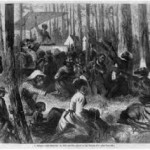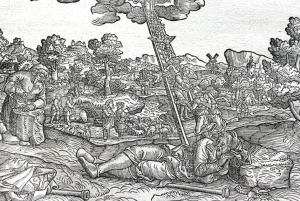
In 1968 or so, when the rest of the world was reeling with revolution, someone gave me a Jesus Person Pocket Promise Book, a slender little paperback with a list of quotations. Each was a biblical promise. Every promise portended a bright future for me. Every promise promised that things would be okay.
I grew up with formulas—as you probably did, too. Study hard, and you’ll get a good job. Be good to others, and they’ll be good to you. Raise a child in the way he (or she) should go, and when he is old, he won’t depart from it.
Then I grew up. College friends lost their young husbands and wives to cancer. I lost a job. People whom I loved—my father, for instance—died. I spent years disappointed at failed pregnancies. I spent nights and days in emergency rooms with a heart that wouldn’t settle down. I watched students who studied hard find no job at the end of the college rainbow. I saw my friends’ children raised in the faith turn from it. Yes, I grew up.
That’s why I teach the Wisdom Tradition in the Bible (books like Job, Proverbs, and Ecclesiastes) by starting with one verse, Ecclesiastes 2:13:
The wise have eyes in their head, but fools walk in darkness.
Eugene Peterson in The Message translates it this way:
It’s better to be smart than stupid, just as light is better than dark.
This looks like it jumped from the pages of the Jesus Person Pocket Promise Book: be wise, and you’ll be better off; be smart, and you’ll do well in life. I think it’s a good rule of thumb. It is better to be smart than stupid. But wisdom can’t protect you from life, from reality, from the rough and tumble of existence.
So The Teacher (the supposed author of Ecclesiastes) eviscerates this formula. He tears it apart. For the next few paragraphs, he rips this proverb open, like a tiger devouring a zebra.
As soon as he quotes this proverb, true though it may be, off he goes on his rant against what we might call “faith by formula.” Here is what the Teacher has to say about this tidy formula:
- “I perceived that the same fate befalls all of them” (2:14). Our wisdom doesn’t change the fact of death. Smart or stupid, we die.
- I must leave it to those who come after me” (2:18). Our wisdom is left to others—all others, not just people of our own choosing. How true is this? I mention the name of towering scholars who taught me, whose books formed me, and today’s seminary students haven’t got a clue. Never heard of him. No idea who she is. Their wisdom, their scholarship, their insights are lost on my students.
- “For all their days are full of pain, and their work is a vexation” (2:23). I get this. Hunching over a computer, stooped over a desk, no matter how much wisdom it yields, hurts in the end. And other parts of my body, too.
- “They cannot find out what God has done from the beginning to the end” (3:11). Thirty years I’ve been at this business of reading and writing, scholarship and teaching, faith and learning, and I still haven’t figured out God and God’s activity in our world.
- “In the place of justice, wickedness was there, and in the place of righteousness, wickedness was there as well” (3:16). Think of the old adage, “I wouldn’t join a club that would have me as a member.” Once I’m in, there goes perfection. Say goodbye to pure righteousness.
I’m not exactly sure what the apostle Paul meant when he wrote, “When I became an adult, I put an end to childish ways” (1 Corinthians 13:11), but I’d like to think he took his cue from The Teacher and put formulas in their proper place.
They’re formulas, after all—not prophylactics that protect us from death, ignorance, pain, and evil.
I think the Teacher knew this, which makes me wonder—Was he disillusioned when he attacked that formula? Had he lost patience with the book of Proverbs, the mother lode of formulas? Maybe, but I prefer to think he was simply realistic. That’s why he ends his diatribe on another note: “So I saw that there is nothing better than that all should enjoy their work, for that is their lot; who can bring them to see what will be after them?” (Ecclesiastes 3:22).
Ironically, sometimes I’ve followed the Teacher’s advice in this last formula. There are mornings when I drive over the Ballard bridge, the sun peering over the Cascade mountains to my left, Fisherman’s Terminal, a working harbor, below on my right, on my way to work—on my way to enjoy my work. Thoughts of the inevitability of death, the poor showing of students, a herniated disc, the limits of my scholarship, and my own entrenched sinfulness (all the things The Teacher talked about in that list above) evanesce, if only for a moment, as I drive, windows open, heat blazing, music blasting, to work.
















